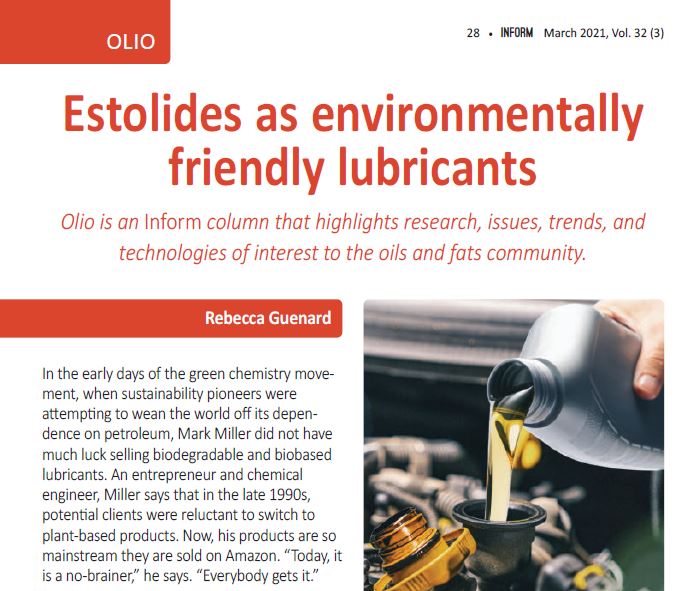
Biosynthetic® Technologies and DOD Case Study
November 26, 2019
What are Estolides?
December 18, 2019Plant-Based Synthetic Lubricant Base Stock Reduces Emissions
Dependence on foreign oil is a growing concern, as is urban runoff water, which contains significant amounts of oil and petroleum products that contaminate America’s waterways. While using bio-based oils such as vegetable oil would alleviate this problem, these oils have been found to have several performance challenges, such as oxidation, which prohibit them from being used as lubricants. Increased availability of bio-based lubricant fluids would:
- provide product source diversity
- create additional options for government, commercial, and consumer purchases
- reduce dependence on oil imports
- decrease pollution in rivers and oceans
With assistance from DOE’s Inventions and Innovation Program and additional venture capital funding, Biosynthetic Technologies LLC, in collaboration with the U.S. Department of Agriculture, has patented a new class of ester molecules that make bio-based synthetic motor oils and lubricants a reality. To overcome vegetable oils’ inherent performance challenges, Biosynthetic Technologies has patented a process that rearranges the fatty acids in vegetable oils into new synthetic molecules.
To improve oxidative stability, minimal amounts (1%-2%) of oxidative stability additive are added and the oil becomes equal or superior to conventional base oils from fossil fuel sources. When used in industrial lubricants of all types, Biosynthetic Technologies’ oils achieved superior performance in many critical performance areas, including:
- pour point
- viscosity index
- flashpoint
- evaporative loss
Biosynthetic Technologies’ patented oils can be used as the base material in industrial lubricants finished products. These bio-based oils exhibit many superior characteristics to petroleum lubricant oils and cause less engine friction than petroleum-based motor oils, which could improve both machine life and fuel economy. These oils biodegrade at a rate similar to vegetable oils such as canola oil and meet the Organization for Economic Co-operation and Development’s (OECD’s) highest biodegradability standards. Having tested these biosynthetic oils extensively, several of the world’s largest manufacturers of automotive and industrial lubricants are now formulating and certifying finished products they will bring to market under their own brand names.




